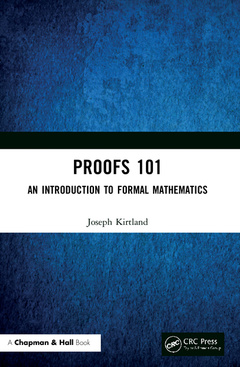Proofs 101 An Introduction to Formal Mathematics
Auteur : Kirtland Joseph

Proofs 101: An Introduction to Formal Mathematics serves as an introduction to proofs for mathematics majors who have completed the calculus sequence (at least Calculus I and II) and a first course in linear algebra.
The book prepares students for the proofs they will need to analyze and write the axiomatic nature of mathematics and the rigors of upper-level mathematics courses. Basic number theory, relations, functions, cardinality, and set theory will provide the material for the proofs and lay the foundation for a deeper understanding of mathematics, which students will need to carry with them throughout their future studies.
Features
- Designed to be teachable across a single semester
- Suitable as an undergraduate textbook for Introduction to Proofs or Transition to Advanced Mathematics courses
- Offers a balanced variety of easy, moderate, and difficult exercises
1. Logic. 1.1 Introduction. 1.2. Statements and Logical Connectives. 1.3 Logical Equivalence. 1.4. Predicates and Quantifiers. 1.5. Negation. 2. Proof Techniques. 2.1. Introduction. 2.2. The Axiomatic and Rigorous Nature of Mathematics. 2.3. Foundations. 2.4. Direct Proof. 2.5. Proof by Contrapositive. 2.5. Proof by Cases. 2.6. Proof by Contradiction. 3. Sets. 3.1. The Concept of a Set. 3.2. Subset of Set Equality. 3.3. Operations on Sets. 3.4. Indexed Sets. 3.5. Russel’s Paradox. 4. Proof by Mathematical Induction. 4.1. Introduction. 4.2. The Principle of Mathematical Induction. 4.3. Proof by strong Induction. 5. Relations. 5.1. Introduction. 5.2. Properties of Relations. 5.3. Equivalence Relations. 6. Introduction. 6.1. Definition of a Function. 6.2. One-To-One and Onto Functions. 6.3. Composition of Functions. 6.4. Inverse of a Function. 7. Cardinality of Sets. 7.1. Introduction. 7.2. Sets with the same Cardinality. 7.3. Finite and Infinite Sets. 7.4. Countably Infinite Sets. 7.5. Uncountable Sets. 7.6 Comparing Cardinalities.
Author
Joseph Kirtland received his BS from Syracuse University and PhD in mathematics from the University of New Hampshire. He joined the faculty of Marist College in 1992. A highly respected teacher, he has been selected ten times by the students for the Faculty Recognition Award in the School of Computer Science and Mathematics. In 2000, he was presented with the Marist College Board of Trustee's Distinguished Teaching Award, and in 2002, he received the Award for Distinguished College or University Teaching of Mathematics given by the Metropolitan New York section of the Mathematical Association of America. In addition, his first book Identification Numbers and Check Digit Schemes won the Mathematical Association of America’s Beckenbach Book Prize in 2002.
Dr. Kirtland’s professional interests include finite and infinite group theory, applications of group theory, and mathematics education. He also enjoys poetry (Philip Larkin and Mary Oliver are two of his favorite poets), hiking (he and his wife have hiked nearly ever trail in the Catskill Mountains), and cycling (his bike can often be found in northern Dutchess County, NY).
Date de parution : 11-2020
15.6x23.4 cm
Date de parution : 11-2020
15.6x23.4 cm
Thèmes de Proofs 101 :
Mots-clés :
De Morgan's Law; Mathematics proofs; Rational Numbers; Basic number theory; Natural Number; Linear algebra; Empty Set; Logical connective; Closed Form Formula; Truth Table; Compound Statement; Odd; Prime Divisor; Inductive Case; Induction; Bijective Function; Equivalence Relation; Set Builder Notation; Fibonacci Sequence; Pairwise Disjoint; Equivalence Class; Naive Set Theory; Logical Connectives; Venn Diagrams; Index Set; Smallest Natural Number; Quantified Predicate; Logically Equivalent; Opposite Parity



